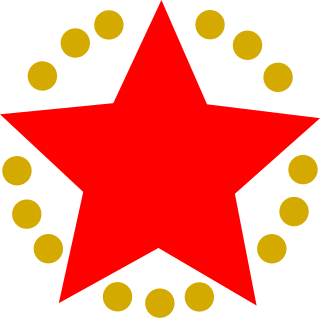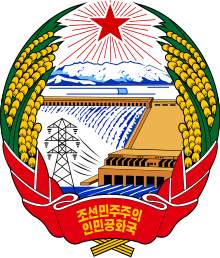
The general secretary of the Workers' Party of Korea is the head of the Workers' Party of Korea, the ruling party in North Korea, and considered as the supreme leader of North Korea. The general secretary is the chairman of the Central Military Commission of the Workers' Party of Korea, as well as a member of the Politburo Presidium, the Politburo and the Secretariat.

The 2nd Central Committee of the Workers' Party of Korea (WPK) was elected at the 2nd Congress on 30 March 1948, and remained in session until the election of the 3rd Central Committee on 29 April 1956. In between party congresses and specially convened conferences the Central Committee is the highest decision-making institution in the WPK and North Korea. The 2nd Central Committee was not a permanent institution and delegated day-to-day work to elected bodies, such as the Political Committee, the Standing Committee, the Organisation Committee and the Inspection Committee in this case. It convened meetings, known as "Plenary Session of the [term] Central Committee", to discuss major policies. Only full members had the right to vote, but if a full member could not attend a plenary session, the person's spot was taken over by an alternate. Plenary session could also be attended by non-members, such meetings are known as "Enlarged Plenary Session", to participate in the committee's discussions. During its tenure it held five plenary sessions, one enlarged session, seven joint plenary sessions and four stand-alone plenums.

The Chairman and Vice Chairman of the Workers’ Party of Korea (WPK) were offices that existed within the WPK between 1949–66 and 2016–21. The office of "Chairman of the Central Committee" existed between 1949–66 and the office of "Chairman of the Workers' Party of Korea" existed in 2016–21. The deputy to the Chairman, the officeholder of Vice Chairman of the Central Committee existed in 1949–66 and 2016–21. This list also includes the chairmen and vice chairmen of the direct predecessors of the WPK.

The 5th Central Committee of the Workers' Party of Korea (WPK) was elected at the 5th Congress on 13 November 1970. and remained in session until the election of the 6th Central Committee on 14 October 1980. In between party congresses and specially convened conferences the Central Committee is the highest decision-making institution in the WPK and North Korea. The Central Committee is not a permanent institution and delegates day-to-day work to elected bodies, such as the Political Committee, the Secretariat and the Inspection Committee in the case of the 5th Central Committee. It convenes meetings, known as "Plenary Session of the [term] Central Committee", to discuss major policies. Only full members have the right to vote, but if a full member cannot attend a plenary session, the person's spot is taken over by an alternate. Plenary session can also be attended by non-members, such meetings are known as "Enlarged Plenary Session", to participate in the committee's discussions.

The 3rd Central Committee of the Workers' Party of Korea (WPK) was elected at the 3rd Congress on 29 April 1956, and remained in session until the election of the 4th Central Committee on 18 September 1961. In between party congresses and specially convened conferences the Central Committee is the highest decision-making institution in the WPK and North Korea. The Central Committee is not a permanent institution and delegates day-to-day work to elected bodies, such as the Standing Committee, the Organisation Committee and the Inspection Committee in the case of the 3rd Central Committee. It convenes meetings, known as "[month] Plenary Session of the Central Committee", to discuss major policies. Only full members have the right to vote, but if a full member cannot attend a plenary session, the person's spot is taken over by an alternate. Plenary session can also be attended by non-members, such meetings are known as "Enlarged Plenary Session", to participate in the committee's discussions.

The 4th Central Committee of the Workers' Party of Korea (WPK) was elected at the 4th Congress on 18 September 1961. and remained in session until the election of the 5th Central Committee on 13 November 1970. In between party congresses and specially convened conferences the Central Committee is the highest decision-making institution in the WPK and North Korea. The Central Committee is not a permanent institution and delegates day-to-day work to elected bodies, such as the Political Committee, the Secretariat and the Inspection Committee in the case of the 4th Central Committee. It convenes meetings, known as "Plenary Session of the [term] Central Committee", to discuss major policies. Only full members have the right to vote, but if a full member cannot attend a plenary session, the person's spot is taken over by an alternate. Plenary session can also be attended by non-members, such meetings are known as "Enlarged Plenary Session", to participate in the committee's discussions.
The 4th Political Committee of the Workers' Party of Korea (WPK), officially the Political Committee of the 4th Central Committee (4th CC), was elected in the immediate aftermath of the 4th WPK Congress on 18 September 1961 by the 4th CC's 1st Plenary Session.

Members of the Control Commission (CC) of the Workers' Party of Korea were elected by the 1st Plenary Session of a WPK Central Committee. In the two predecessor organisations, the Central Inspection Commission of the Workers' Party of North Korea (WPNK) and the Inspection Committee of the Workers' Party of South Korea (WPSK), members were elected by the party congress. Control Commission members were responsible for ensuring party discipline, enforcing and protecting the party rules, and punishing members who breached rules and regulations.
The Organisation Committee of the Workers' Party of Korea(조선로동당 중앙위원회 조직위원회) was established in 1946 and abolished at the 4th Congress of the Workers' Party of Korea.

The 3rd Standing Committee of the Supreme People's Assembly (SPA) was elected by the 1st Session of the 3rd Supreme People's Assembly on 23 October 1962. It was replaced on 16 December 1967 by the 4th SPA Standing Committee.

The 4th Standing Committee of the Supreme People's Assembly (SPA) was elected by the 1st Session of the 4th Supreme People's Assembly on 16 December 1967. It was replaced on 28 December 1972 by the 5th SPA Standing Committee and the 5th Central People's Committee.

The committees of the 3rd Supreme People's Assembly (SPA) were elected by the 1st Session of the aforementioned body on 23 October 1962. It was replaced on 16 December 1967 by the committees of the 4th Supreme People's Assembly.

The committees of the 4th Supreme People's Assembly (SPA) were elected by the 1st Session of the aforementioned body on 16 December 1967. It was replaced on 28 December 1972 by the committees of the 5th Supreme People's Assembly.

The 6th Central People's Committee (CPC) of North Korea was elected by the 1st Session of the 6th Supreme People's Assembly on 17 December 1977. It was replaced on 5 April 1982 by the 7th CPC.

The 3rd Cabinet of North Korea was elected by the 1st Session of the 3rd Supreme People's Assembly on 23 October 1962. It was replaced on 16 December 1967 by the 4th Cabinet.

The 5th Administrative Council of North Korea was elected by the 1st Session of the 5th Supreme People's Assembly on 26 December 1972. It was replaced on 16 December 1977 by the 6th Administrative Council.

The 6th Administrative Council of North Korea was elected by the 1st Session of the 6th Supreme People's Assembly on 16 December 1977. It was replaced on 5 April 1982 by the 7th Administrative Council.

The 3rd Supreme People's Assembly (SPA) was elected on 8 October 1962 and convened for its first session on 22–23 October 1962. It was replaced on 16 December 1967, by the 4th Supreme People's Assembly.

The 4th Supreme People's Assembly (SPA) was elected on 25 November 1967 and convened for its first session on 14–16 December 1967. It was replaced on 25 December 1972 by the 5th Supreme People's Assembly.

The 5th Supreme People's Assembly (SPA) was elected on 12 December 1972 and convened for its first session on 25–28 December 1972. It was replaced on 17 December 1977 by the 6th Supreme People's Assembly.







